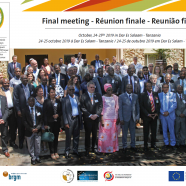Final Meeting of the PanAfGeo Project
On 24 and 25 October 2019, about 70 PanAfGeo partners from around 50 European and African countries gathered in Dar es Salaam, Tanzania, for the Phase 1 closing meeting. The Ministers responsible for minerals in Tanzania and Kenya were the guests of honour. Attendees included some of the project’s main contributors: OAGS Executive Committee members, stakeholders and representatives of Geological Surveys in Africa and Europe and the European Commission.
An overview of all the PanAfGeo Project activities performed under each work package was presented and was followed by a feedback session. A complete review of the three years of training was presented by each WP leader. The complete list of the PanAfGeo work packages are available here: www.panafgeo.eurogeosurveys.org/about
The PanAfGeo Project: an overview (2016-2019)
Results and impacts:
PanAfGeo increased the technical competence of 1,074 trainees from 49 African countries (all except Burundi, Libya, Mauritius, Seychelles and Somalia). No other EU programme so far has ever had such a cross-continental geographical coverage, overcoming language (trainings in three languages: English, French, Portuguese), cultural and political barriers.
The European Commission’s intention of increasing attention for more effective cooperation with Africa has therefore been fully met by PanAfGeo Phase 1, through its geoscience training programmes for officers of African Geological Surveys. The programme has clearly strengthened the partnership between EU and African countries in several areas, bringing substantial benefits to the societies in Africa and, indirectly, in Europe, through the establishment of stable institutional relations based on mutual trust and respect. The consideration of many African Ministers being present at various PanAfGeo events proves the impact generated at the highest decision making and political levels.
The future – PanAfGeo Phase 2:
Nevertheless, there is always room for improvement and the framework of possible work packages for PanAfGeo-2 were discussed at the final meeting in Tanzania, with an emphasis on additional activities that would lead to increased (institutional) capacity of African Geological Surveys. The key ambition is to align as much as possible with the new European Commission priority ‘A stronger Europe in the World’, by putting in place a more comprehensive and ambitious strategy for PanAfGeo-2 itself. One possibility might be offered by establishing a collaboration with other complementary projects (such as GMES Africa) in order to achieve synergies in land and geo-resources management. The latter is closely linked to climate change adaptation goals that are tackled within the proposed EU Green Deal, another of Ms U. von der Leyen’s priorities as President of the European Commission. The cooperation between European and African Geological Surveys within PanAfGeo-2 will further strengthen the geological sector at government level in Africa and will, therefore, allow for the increased capacity in managing geo-resources and environmental matters by national administrations. This represents a step forward in the political commitment to the development of EU-Africa cooperation as described in MIP Pan-African 2018-2020.
PanAfGeo-2 will thus encompass: (1) strengthening the level of geological knowledge and skills in national Geological Surveys through trainings; (2) enhancing the institutional and technical capacity and role of African national Geological Surveys; (3) contributing to improved mineral resources assessment, management and governance by national Geological Surveys in Africa, (4) increasing the activities of national Geological Surveys related to regional mapping and exploration, as well as upgrading their geoscientific information base and mineral inventories; (5) creating a Pan-African network of experts through the Organisation of African Geological Surveys (OAGS), supported by the organisation of the Geological Surveys of Europe (EuroGeoSurveys); (6) supporting the European (Commission) and pan African institutions (African Union) in achieving their strategic policy goals on AU-EU cooperation.
- The interview done with Mr. Jose Correia Nunes, Head of Development Cooperation, Minister Counsellor of the European Union in Tanzania and the East African Community can be found in the following link: youtu.be/EqAK4eQmmqE
- The pictures of the PanAfGeo Project final meeting are available here: www.panafgeo.eurogeosurveys.org/portfolio/panafgeo-final-meeting
- Click here to download the report of the PanAfGeo final meeting.

